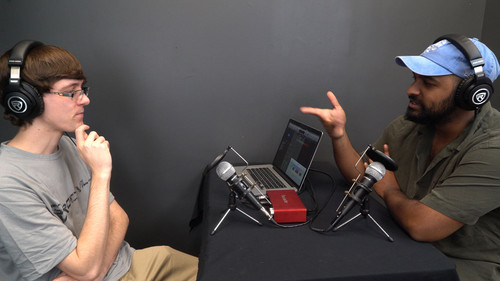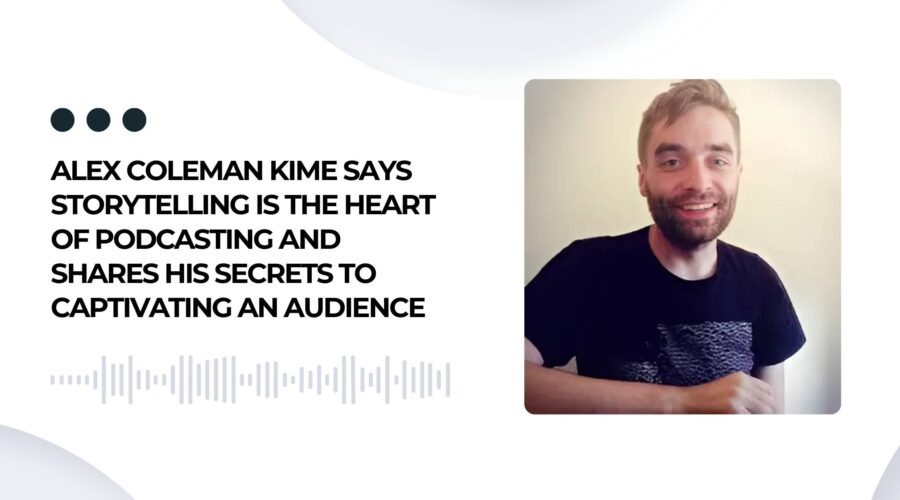In this interview, Alex Coleman Kime takes us through his fascinating journey in the world of podcasting, from his early passion for storytelling to his rise as a skilled podcast developer, producer, and editor.
Alex Kime opens up about his creative process, the importance of storytelling in podcasting, and how personal experiences have shaped his approach to audio content. He shares his thoughts on the role of sound design, how to captivate an audience, and the challenges of standing out in a crowded podcasting space. Additionally, Alex offers insights into the future of podcasting and his plans for upcoming projects, giving listeners a deeper understanding of what it takes to succeed in this evolving medium.
Interviewer – Thank you for joining us, Alex Coleman Kime. You’ve been called a podcasting expert. Can you start by telling us what made you choose podcasting as your career?
Alex Coleman Kime – Thank you for having me! I was drawn to podcasting because it’s such a creative and personal medium. It allows people to share their stories with the world in a way that feels intimate. Anyone with a microphone and a great idea can start a podcast, which makes it so accessible. I’ve always loved how stories can inspire, teach, or entertain, and podcasting felt like the perfect way to combine my love for storytelling with technology. It’s incredible to see how podcasts bring people together, even when they’re thousands of miles apart.
Interviewer – You’ve often said that storytelling is the heart of podcasting. Why do you think it’s so important?
Alex Coleman Kime – Storytelling is what makes a podcast stand out and stay in people’s minds. Whether you’re listening to a crime podcast, a comedy show, or even a business series, the thing that draws you in is the story. Stories have been part of human culture for thousands of years because they make us feel something of curiosity, excitement, empathy, or even suspense. Without a strong story, a podcast can feel scattered or unmemorable. A well-told story connects with listeners and keeps them coming back for more.
Other Interview: Gabriel Kalembo Says, “Embrace failures as learning opportunities, and always seek to improve”
Interviewer – What do you think makes a story truly captivating for a podcast audience?
Alex Coleman Kime – A captivating story has a few key elements. First, structure is important. Every story needs a beginning, middle, and end. It should take listeners on a journey. Second, authenticity matters. If a story doesn’t feel genuine, listeners will lose interest quickly. Third, it’s about creating moments of tension and resolution. Whether it’s a dramatic twist, a surprising insight, or an emotional moment, these are the things that keep listeners hooked. And finally, sound design plays a big role. Music, sound effects, and pacing can amplify the emotional impact of a story and make it unforgettable.

Interviewer – When you work with clients, how do you help them create stories that resonate with their audience?
Alex Coleman Kime – It always starts with understanding their goals and their audience. Who are they trying to reach? What message do they want to share? Once we’ve answered those questions, we brainstorm ideas and pick the strongest one. Then, we map out a structure for the story, making sure it flows naturally and keeps the audience engaged. If the podcast includes interviews or personal experiences, we weave those into the narrative. The key is to make sure the client’s voice and vision are at the center of the story. It’s a collaborative process, and the result is always unique to them.
Interviewer – What role does sound quality play in storytelling for podcasts?
Alex Coleman Kime – Sound quality is critical. Even if you have the best story in the world, listeners will turn it off if the audio isn’t clear. But sound quality is more than just having a good microphone. It’s about using music, sound effects, and even silence to create the right mood. For example, a soft piano melody can make a moment feel emotional, while a sudden pause can build suspense. These little touches make a story come alive and help the audience feel more connected to what they’re hearing.

Interviewer – Podcasting has become very popular. How can someone make their podcast stand out in such a crowded space?
Alex Coleman Kime – It’s true, podcasting is more competitive than ever. To stand out, you need to be unique. Find a topic or perspective that no one else is covering, or tell your story in a way that’s different from everyone else. It’s also important to connect with your audience. Respond to their comments, ask for their feedback, and make them feel like they’re part of the journey. Consistency is another key factor. If you release episodes regularly, your audience will know when to expect new content, and they’ll keep coming back for more.
Other Interview: Joby Harte Says “Don’t be afraid to take risks sometimes the best opportunities come from stepping out of your comfort zone.”
Interviewer – Many people want to start a podcast but don’t know where to begin. What advice would you give to beginners?
Alex Coleman Kime – Start simple. Don’t worry about having the best equipment or a perfect setup. Focus on your idea first. What do you want to talk about? Who do you want to reach? Once you have a clear idea, just start recording. Your first episodes might not be perfect, and that’s okay. The more you practice, the better you’ll get. And remember to listen to your audience. They’ll let you know what they like and what they want more of.
Interviewer – What are some common mistakes you see new podcasters make?
Alex Coleman Kime – One common mistake is trying to do too much at once. Some people want to cover every topic or include every idea in their first few episodes, which can make the podcast feel unfocused. Another mistake is not paying enough attention to sound quality. Poor audio can turn listeners away quickly. Lastly, some podcasters forget about consistency. If you only release episodes sporadically, it’s hard to build an audience. Planning ahead and sticking to a schedule can make a big difference.

Interviewer – Can you share an example of a podcast you’ve worked on that you’re especially proud of?
Alex Coleman Kime – One podcast that stands out is a series I worked on with a small business owner. They wanted to share their journey of starting their company and the challenges they faced along the way. It was such an emotional and inspiring story, and the response from their audience was incredible. Hearing how the podcast resonated with listeners and even inspired some of them to start their own businesses was incredibly rewarding. It reminded me why I love podcasting so much.
Interviewer – What do you think the future of podcasting looks like?
Alex Coleman Kime – Podcasting is only going to grow. More people are discovering podcasts every day, and new technology is making it easier to create and listen to them. I think we’ll see more innovative formats and more diverse voices in the space. Podcasts will continue to be a powerful way to share stories, connect with audiences, and even educate people. It’s an exciting time to be part of the podcasting world, and I can’t wait to see where it goes next.
Interviewer – Finally, what’s the one thing you want people to remember about creating a great podcast?
Alex Coleman Kime – Focus on the story. No matter how good your sound quality is or how much you promote your podcast, the story is what will keep people listening. Be authentic, put your heart into it, and make sure you’re sharing something that matters to you. If you do that, your podcast will stand out and make an impact.
Interviewer – Thank you so much, Alex. This has been an incredible conversation.
Alex Coleman Kime – Thank you! I’ve enjoyed sharing my thoughts, and I hope it inspires others to start their podcasting journey.

